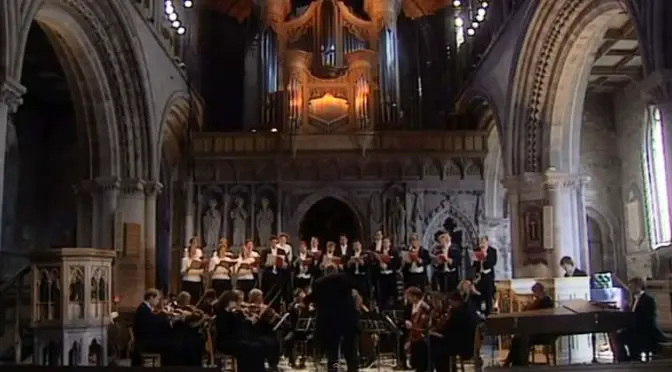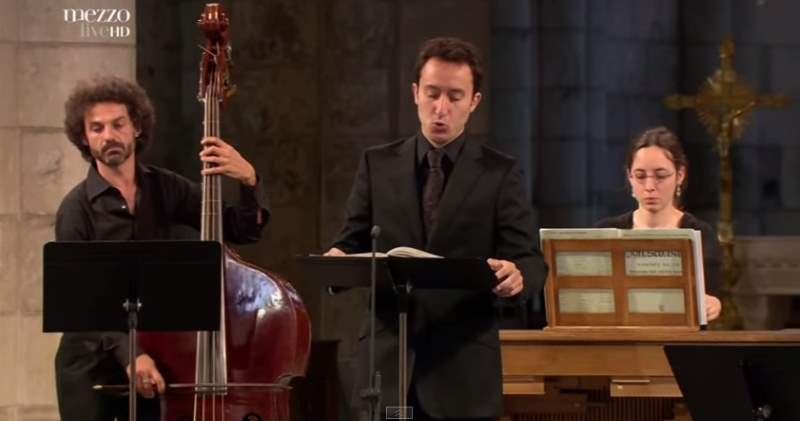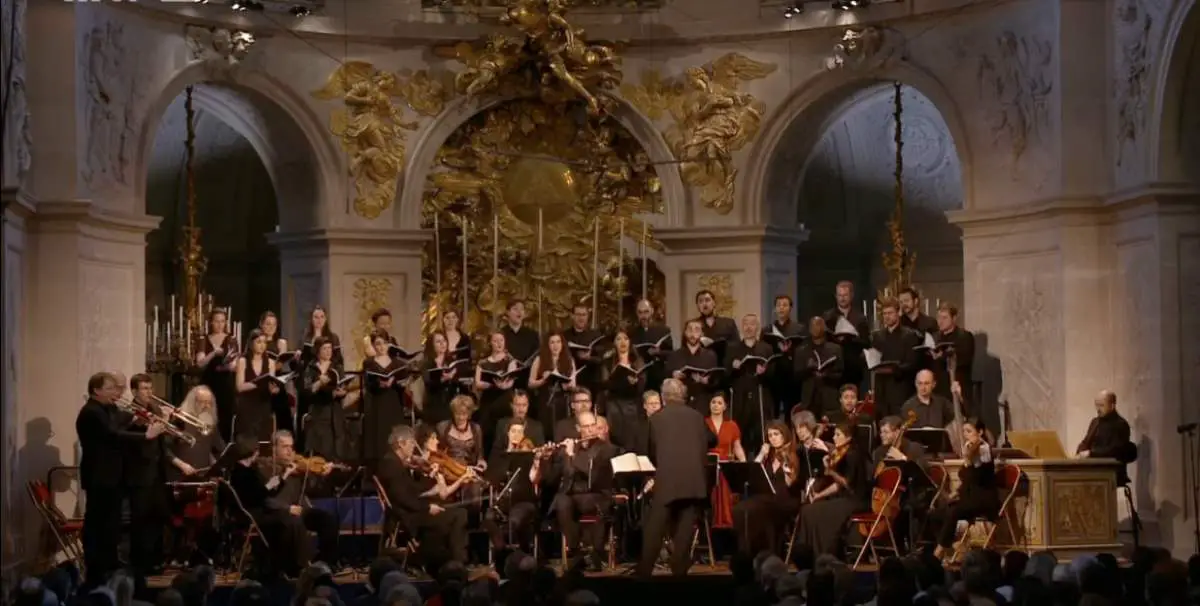Conducted by John Eliot Gardiner, the English Baroque Soloists and Monteverdi Choir perform Johann Sebastian Bach’s cantatas Siehe zu, daß deine Gottesfurcht nicht Heuchelei sei (See to it, that your fear of God be not hypocrisy), BWV 179; Mein Herze schwimmt im Blut (My heart swims in blood), BWV 199; and Herr Jesu Christ, du höchstes Gut (Lord Jesus Christ, O highest good), BWV 113.
Programme (Bach: Cantatas BWV 179, 199, and 113)
- Siehe zu, daß deine Gottesfurcht nicht Heuchelei sei, BWV 179
- Chorus: Siehe zu, daß deine Gottesfurcht nicht Heuchelei sei
- Recitative (tenor): Das heutge Christentum ist leider schlecht bestellt
- Aria (tenor): Falscher Heuchler Ebenbild
- Recitative (bass): Wer so von innen wie von außen ist
- Aria (soprano): Liebster Gott, erbarme dich
- Chorale: Ich armer Mensch, ich armer Sünder
- Mein Herze schwimmt im Blut, BWV 199
- Recitative: Mein Herze schwimmt im Blut
- Aria: Stumme Seufzer, stille Klagen
- Recitative: Doch Gott muss mir genädig sein
- Aria: Tief gebückt und voller Reue
- Recitative: Auf diese Schmerzensreu
- Chorale: Ich, dein betrübtes Kind
- Recitative: Ich lege mich in diese Wunden
- Aria: Wie freudig ist mein Herz
- Herr Jesu Christ, du höchstes Gut, BWV 113
- Chorale: Herr Jesu Christ, du höchstes Gut
- Chorale (alto): Erbarm dich mein in solcher Last
- Aria (bass): Fürwahr, wenn mir das kömmet ein
- Recitative + Chorale (bass) Jedoch dein heilsam Wort, das macht
- Aria (tenor): Jesus nimmt die Sünder an
- Recitative (tenor): Der Heiland nimmt die Sünder an
- Aria (soprano, alto): Ach Herr, mein Gott, vergib mirs doch
- Chorale: Stärk mich mit deinem Freudengeist
Magdalena Kožená: soprano
Mark Padmore: tenor
Stephan Loges: bass
Notes
- Siehe zu, daß deine Gottesfurcht nicht Heuchelei sei (See to it, that your fear of God be not hypocrisy), BWV 179, is a church cantata by Johann Sebastian Bach. He composed it in Leipzig for the eleventh Sunday after Trinity and first performed it on 8 August 1723. Bach composed the cantata in his first year in Leipzig, which he had started after Trinity of 1723, for the eleventh Sunday after Trinity. The prescribed readings for the Sunday were from the First Epistle to the Corinthians, on the gospel of Christ and Paul’s duty as an apostle (1 Corinthians 15:1–10), and from the Gospel of Luke, the parable of the Pharisee and the Tax Collector (Luke 18:9–14). The unknown poet stayed close to the gospel and alluded to several Bible passages. The cantata is opened by a line from Wisdom of Sirach 1:29. the closing chorale is the first stanza of Christian Tietze’s hymn “Ich armer Mensch, ich armer Sünder” (1663). Bach first performed the cantata on 8 August 1723. Alfred Dürr assumes that Mein Herze schwimmt im Blut, BWV 199, composed for the same occasion in Weimar, was also performed in the service.
- Mein Herze schwimmt im Blut (My heart swims in blood), BWV 199, is a church cantata by Johann Sebastian Bach. He composed the solo cantata for soprano in Weimar for the eleventh Sunday after Trinity and first performed it on 12 August 1714. On 2 March 1714 Bach was appointed concertmaster of the Weimar court capelle of the co-reigning dukes Wilhelm Ernst and Ernst August of Saxe-Weimar. As concertmaster, he assumed the principal responsibility for composing new works, specifically cantatas for the Schlosskirche (palace church), on a monthly schedule. He composed the cantata for the eleventh Sunday after Trinity as the fifth cantata of the series, following Weinen, Klagen, Sorgen, Zagen, BWV 12. The prescribed readings for the Sunday were from the First Epistle to the Corinthians, on the gospel of Christ and his (Paul’s) duty as an apostle (1 Corinthians 15:1–10), and from the Gospel of Luke, the parable of the Pharisee and the Tax Collector (Luke 18:9–14). The text, which concerns a sinner finding redemption, was written by Georg Christian Lehms and published in Gottgefälliges Kirchen-Opffer. The same author had written the text for Widerstehe doch der Sünde, BWV 54, composed the month before. Movement 6 is the third stanza of Johann Heermann’s hymn “Wo soll ich fliehen hin”. The cantata text had been set to music in 1712 by Johann Christoph Graupner in Darmstadt. It is not known if Bach knew of Graupner’s composition. Bach first performed the cantata on 12 August 1714. He made revisions for later performances, and the Neue Bach-Ausgabe recognises two distinct versions, the Weimar version and the Leipzig version.
- Herr Jesu Christ, du höchstes Gut (Lord Jesus Christ, O highest good), BWV 113, is a church cantata by Johann Sebastian Bach. He composed the chorale cantata in Leipzig for the eleventh Sunday after Trinity and first performed it on 20 August 1724. It is based on the hymn by Bartholomäus Ringwaldt (1588). Bach composed the cantata in Leipzig for the Eleventh Sunday after Trinity as part of his second cantata cycle and first performed it on 20 August 1724. The prescribed readings for the Sunday were from the First Epistle to the Corinthians, on the gospel of Christ and his (Paul’s) duty as an apostle (1 Corinthians 15:1–10), and from the Gospel of Luke, the parable of the Pharisee and the Tax Collector (Luke 18:9–14). The text of the cantata is based on the eight stanzas of Bartholomäus Ringwaldt’s hymn (1588), a song of penitence related to the tax collector’s prayer “Herr, sei mir armem Sünder gnädig” (God be merciful to me a sinner). The melody is also attributed to Ringwaldt. An unknown poet kept the words unchanged in movements 1, 2, 4 and 8, but inserted recitative in movement 4. He transcribed the ideas of the remaining stanzas to arias and a recitative, keeping the beginning of stanzas 3 and 7. He treated stanzas 5 and 6 most freely, including ideas from the epistle such as the promise of mercy, which is only asked, not promised, in the chorale. He refers to several verses from different gospels to underscore that thought, Luke 15:2 in both 5 and 6, Matthew 9:2 (parallel Luke 7:48) in 5, and Matthew 11:28 in 6, paraphrased as “Er ruft: Kommt her zu mir, die ihr mühselig und beladen” (He calls: come here to Me, you who are weary and burdened). The last verse also appears in Handel’s Messiah, turned in the third person: “Come unto Him, all ye that labour”, in the soprano section of He shall feed His flock like a shepherd.
Sources
- Siehe zu, daß deine Gottesfurcht nicht Heuchelei sei, BWV 179 on wikipedia
- Mein Herze schwimmt im Blut, BWV 199 on wikipedia
- Herr Jesu Christ, du höchstes Gut, BWV 113 on wikipedia
- Pavarotti sings Pourquoi me réveiller [Massenet] at the Central Park in 1993 - April 23, 2024
- Elgar: Serenade for Strings [Concertgebouw Chamber Orchestra] - April 19, 2024
- Mozart: Serenade No. 10 “Gran Partita” [MET Orchestra Chamber Ensemble] - April 18, 2024


